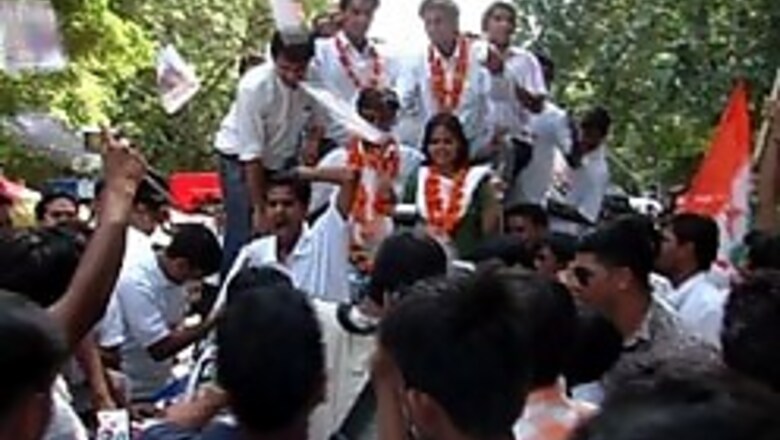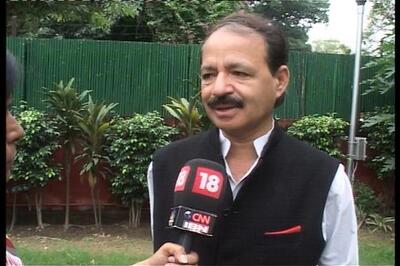
views
New Delhi: Even as Delhi University goes to polls on Friday to elect a new body for the Delhi University Students' Union, a survey of academia and students shows both do not really like the entire idea of having student unions.
The shocking death of a college professor after being heckled by unruly students - an incident that drew nationwide condemnation - is also making teachers and students give a thumbs down to the heavily-politicised student unions, reports from across the country indicate.
Many academics and students complained that unions that once played a valuable role in building the character of the student community have grotesquely turned into playthings for political parties, injecting hooliganism and rowdy conduct on campuses.
Some of the student leaders of the 1970s and '80s are today leading lights in Indian politics. But many of them are dogged by unsavoury reputation, and that has not helped matters.
The varying opinions are part of a debate sparked off by the Aug 26 attack on HS Sabharwal of Madhav College in Ujjain town, following which two leaders of the Akhil Bharatiya Vidyarthi Parishad (ABVP) have been charged with murder.
Some students and lecturers, however, feel that student unions should continue - but with a sense of discipline.
Elections to student unions in university after university have become bloody affairs. Student leaders tend to copy everything that is ugly with the country's larger electoral politics.
No wonder teachers in Lucknow University, one of the biggest in India, have decided to boycott student polls this year.
A disgusted DP Tiwari, president of the Lucknow University Teachers Association, told IANS: "The contribution of student unions is limited to pushing fake admissions, bagging construction contracts and extorting money from traders, shopkeepers and industrialists besides indulging in criminal activities.
"All that teachers get in return for performing election duty is humiliation, intimidation, abuse and assault. Since governments are very enthusiastic about these elections, why don't they appoint a separate election commissioner to conduct student polls?"
The extreme reaction is understandable since television channels are still relaying the way Sabharwal, a heart patient, was pushed and beaten until he collapsed and was declared dead at hospital, shocking the entire country.
PAGE_BREAK
In Bangalore, former vice-chancellor MS Thimmappa suggested: "It is better for students to concentrate on studies, sports and extra-curricular activities." Even students agree.
A third year arts student at the MS University in Vadodara said, "The role of student unions is limited to getting exams postponed and forcing strikes in colleges. I haven't seen them do anything constructive."
But there are others who see hope for student bodies. B Srinivas Rao, reader in the department of business management at Osmania University, Hyderabad said: "Dissent and debate on matters of wider socio-political concerns serve as a healthy channel for growth and future leadership."
SK Vij, dean of students' welfare in Delhi University, one of the best in India, also believes in giving democratic space to students. "With proper checks and balances student elections can be fruitful."
Zamiruddin, a retired professor in Madhya Pradesh, also underlined the need to direct student unions to act positively.
Mona Das, president of the Jawaharlal Nehru University Students Union here, said: "Student unions backed by mainstream political parties are running out of ideas. They are no longer taking up progressive issues."
PAGE_BREAK
The Ujjain episode is not the only case worrying educationists. In July, there was an attack on a professor at Wilson College in Mumbai by members of the National Students Union of India (NSUI). Professor Vilas Athavale was targeted for allegedly misbehaving with a girl student.
With students increasingly taking law into their hands, both the students' fraternity and teachers are asking: If the professor is not found guilty, who will pay for the humiliation he suffered?
Not surprisingly, the relevance of unions is being questioned in Mumbai. "Student unions have a right to agitate but in a peaceful and democratic manner without political motivation," former vice-chancellor of University of Mumbai Snehalata Deshmukh told IANS.
In Ahmedabad, while academicians throw their weight behind student unions, students see them as a nuisance.
In Chandigarh, ahead of union elections, girl students of MCM DAV College protested for two days last week demanding that they be allowed to use mobile phones on campus. The authorities eventually buckled under pressure.
David Raj, a student of Central University, Hyderabad, says: "Student unions in the past were inspired by the freedom struggle and launched many socio-political movements. Today they have become tools of political parties."
Student elections were banned in Bangalore University over 10 years ago. No college union elections have been held in the past two years in private colleges of both the Kerala and Mahatma Gandhi universities.
Tito K Cherian, a professor of English in Kerala, told IANS: "Student leaders who have ambitions to build a career in politics make use of campus politics."
PC Vishnunath, president of the Kerala Students Union, counters: "If there is no union, who will fight for student rights?"
In Raipur and Jaipur, most professors criticised student unions for creating a nuisance.
"Those fighting for student elections have only two objectives - acquire money and muscle power," says a former vice-chancellor of Lucknow who did not want to be named.
A police official in Lucknow maintains a separate register for student offenders. There are 60 student leaders on his list including a minister in the Mulayam Singh government.
In many northeastern states, student unions are a powerful entity, but they seldom take up academic issues.
Devi Prasad Das, an engineering student in Orissa capital Bhubaneswar where there is no union, has a different opinion: "The unions are needed because they promote academics and look after student interest."



















Comments
0 comment